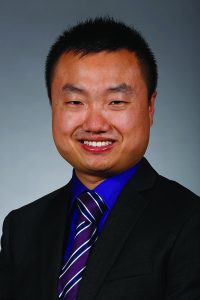 Zhaoyu Wang, assistant professor of electrical and computer engineering, has been selected for the 2021 National Science Foundation’s Faculty Early Career Development Program (CAREER).
Zhaoyu Wang, assistant professor of electrical and computer engineering, has been selected for the 2021 National Science Foundation’s Faculty Early Career Development Program (CAREER).
CAREER awards are the NSF’s most prestigious awards given to early-career faculty. The program aims to build a firm foundation for leadership in integrating research and education.
Problem: Enhanced electric grid monitoring is needed to promote renewable integration while ensuring reliability, but current approaches rely on expensive sensors. Smart meters that electric utilities are already using for billing have potential, but without new computing innovations, smart meters only can provide limited insights into grid performance.
Project: Wang will unlock the potential of smart meters with new optimization and probabilistic graph learning methods to enable data-driven, real-time electric network monitoring.
Wang’s team has three goals. They will create new grid topology and parameter identification algorithms that will leverage available but low-resolution smart meter data, discover data connections, and make possible real-time power distribution grid modeling.
The team will also use new graph learning approaches that connect smart meters and other information sources to make fast and accurate outage detection possible. And, third, Wang’s team will design robust data-recovery techniques to take on challenges in smart meter data asynchrony.
Potential Impact: Wang’s innovations will add up to real-time modeling and fast detection of large-scale outages, using smart meters that are already widely in use.
“By harnessing the data collected by existing smart meters, millions of dollars in potential sensor investments are saved. Our work will bring U.S. utilities much needed data-driven grid monitoring that helps minimize outages. Plus, our advances help promote the seamless integration of renewable energy into grids,” said Wang.
Possibilities: Broader impacts of Wang’s project include integrating power engineering education with data science. He’ll make available open-source data sets, create training for energy professionals and develop interactive smart grid educational activities for high schoolers.
